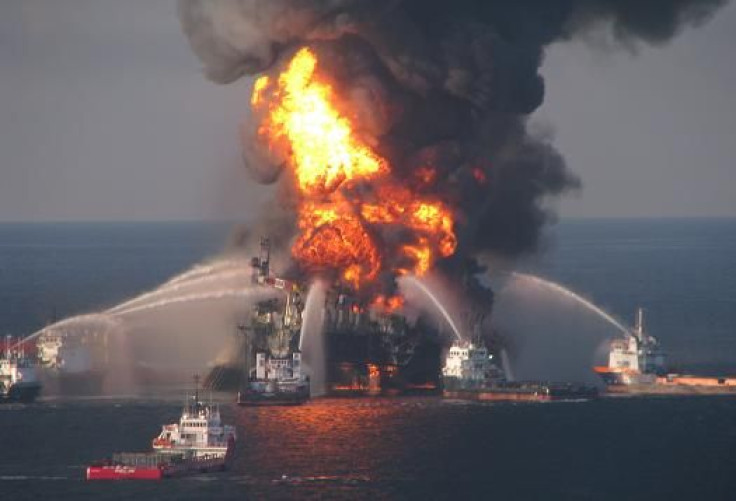BP Loses US Contracts; Execs Plead Not Guilty

Two BP rig supervisors and a former executive pleaded not guilty Wednesday to criminal charges from the 2010 Deepwater Horizon disaster and the company's response.
On the same day, the U.S. government banned BP from new federal contracts over its "lack of business integrity" in the affair, possibly jeopardizing its role as a top U.S. offshore oil and gas producer and the No. 1 military fuel supplier.
BP well site leaders Robert Kaluza and Donald Vidrine, along with former BP vice president of exploration for the Gulf David Rainey, remained free on bond after their arraignments in federal court in New Orleans, CBS reported.
Kaluza and Vidrine are charged with manslaughter in the deaths of 11 rig workers on April 20, 2010. They are accused of disregarding abnormally high pressure readings that should have been red flags of trouble just before the blowout of BP's Macondo well in the Gulf of Mexico.
Rainey was charged separately with concealing information from Congress about the amount of oil that was leaking from the well. Millions of gallons of crude oil spewed from BP's well for months.
"I'm angry that the two middle-management guys are going to take the fall," Stephen Stone, a worker on the Deepwater Horizon who escaped on a lifeboat, told CBS News.
Kaluza professed his innocence on his way into court, making his first public comments since the explosion that killed his co-workers.
"I think about the tragedy of the Deepwater Horizon every day," Kaluza told reporters just before his arraignment. "But I did not cause this tragedy. I am innocent and I put my trust, reputation and future in the hands of the judge and the jury."
Kaluza and Vidrine's lawyers both accused the Justice Department of using their clients as scapegoats. They noted that other government investigations have spread out the blame for the disaster and concluded it was the product of a complex series of mistakes, made both onshore and on the rig.
"Bob and Don did their jobs," said Shaun Clarke, one of Kaluza's attorneys. "They did them correctly and they did them in accordance with their training."
Robert Habans, one of Vidrine's lawyers, said his client diligently followed instructions he received from engineers and others onshore.
"He's not the architect or the engineer. He didn't design the well, and he didn't make the critical decisions in this case," Habans said.
The federal suspension, announced by the Environmental Protection Agency, comes on the heels of BP's Nov. 15 agreement with the U.S. government to plead guilty to criminal misconduct, Reuters reported. The British energy giant agreed to pay $4.5 billion in penalties, including a record $1.256 billion criminal fine.
BP and its affiliates are barred from new federal contracts until they demonstrate they can meet federal business standards, the EPA said. The suspension is "standard practice" and BP's existing U.S. government contracts are not affected, it said.
The EPA acted hours before a government auction of offshore tracts in the Gulf of Mexico, a region where BP is the largest investor and lease-holder of deep-water tracts and hopes for further growth. BP is also the top fuel supplier to the U.S. military, the largest single buyer of oil in the world.
Suspension of contracts could give the government leverage to pressure BP to settle federal and state civil litigation that could top $20 billion if a court finds BP was grossly negligent in the Deepwater Horizon disaster.
An EPA official said government-wide suspensions generally do not exceed 18 months, but can continue longer if there are ongoing legal cases.
The case against Kaluza and Vidrine centers on their roles in supervising "negative testing," which is designed to assess whether a cement barrier is effectively preventing oil or gas from flowing up the well. The indictment says they had "multiple indications" from the negative testing that the well wasn't secure. Yet they allegedly failed to alert onshore engineers about the problems during the testing, accepted a "nonsensical explanation" for abnormal pressure readings and eventually decided to stop investigating.
Habans, however, said court records related to civil litigation over the spill indicates Vidrine did discuss the test results with an onshore engineer less than an hour before the blast. A Justice Department attorney questioned a BP expert about the phone conversation between Vidrine and the engineer, Mark Hafle.
"It's almost inconceivable to me that the government in the indictment makes a contrary allegation," Habans said.
Lawyers for Rainey declined to comment.
A trial for Kaluza and Vidrine is scheduled to start on Feb. 4, while Rainey has a Jan. 28 trial date. Both dates could be postponed given the complexity of the cases.
© Copyright IBTimes 2024. All rights reserved.











